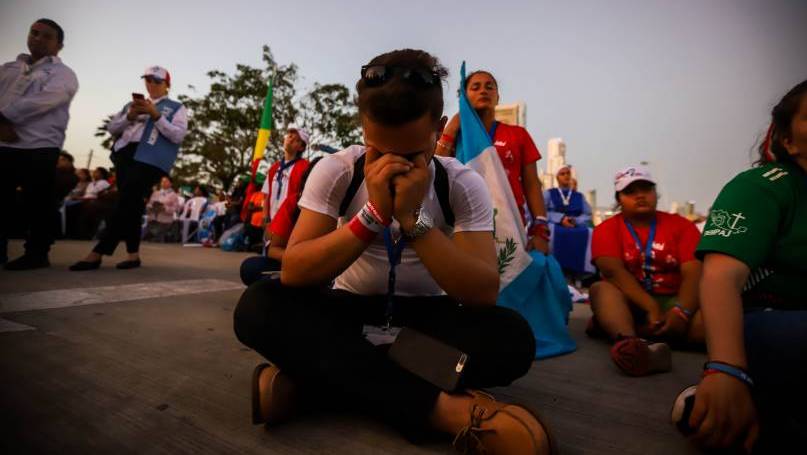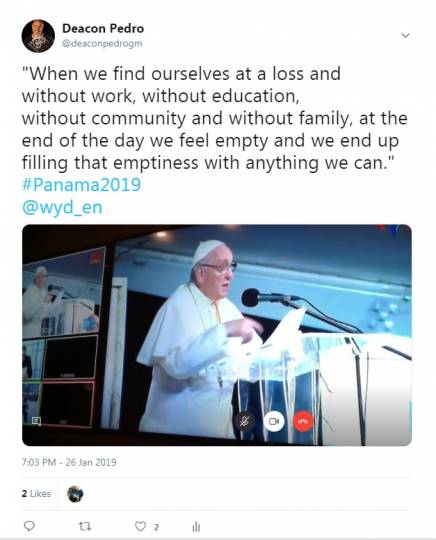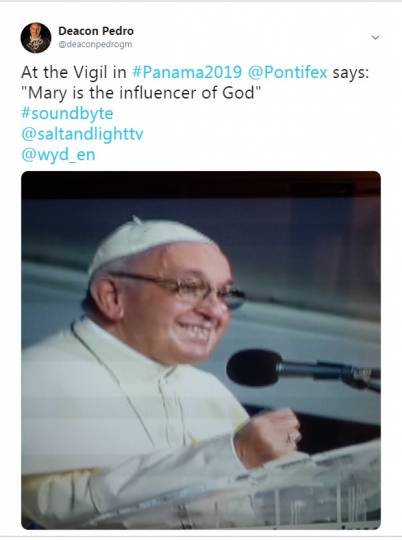Deacon-structing the Call - Lessons from Panama: Dream
Deacon Pedro
Sunday, February 10, 2019

Much was done and said about the fact that this was a Marian World Youth Day.
What was not exploited enough, in my opinion, was that this was also an explicitly “vocational” theme. One of the first times I met with Panamanian Archbishop, Jose Domingo Ulloa, he told me that they had requested from Pope Francis a theme that was both Marian and vocational. I think the Holy Father fulfilled that request perfectly. I am writing this today because, for me, while it was impossible to ignore the Marian influences and emphasis of the event, even leading up to the event, it was also impossible to ignore the vocational push in my own life. I also write this today because today’s readings have to do with the “call”. In the first reading, Isaiah is called. Paul speaks about his call in the second reading. And the Gospel deals explicitly with the call of Peter. This Sunday is a vocational Sunday. Add to this the theme of the last Synod of Bishops: Young People, the Faith and Vocational Discernment. This year has definitely been one to consider vocational discernment.My experience of WYD Panama has very much been one of “call”.
Preparing for this WYD forced me to look back at my life and consider every moment where God called me, as a young child growing up in Panama, through to calling me to come to Canada; to go to theatre school; to marriage and parenthood, to work at Covenant House; to work at WYD 2002 and then on to Salt + Light Television, to being called to the diaconate. Needless to say, these “lessons in vocational discernment” could fill the pages of a book, which I may one day write. (If there are any publishers out there interested in learning more, please don’t hesitate to contact me.) For now, let me focus on three vocational lessons that stood out for me in Panama. Dream, Love, and Belong.DREAM
Right from the moment Pope Francis arrived, he was already speaking about vocation. But the word he used was “dreams”. In addressing the Panamanian president and government officials on the Thursday morning, he said that Panama is “a meeting-point where young people coming from the five continents, brimming with dreams and hopes, will celebrate, meet one another, pray and kindle their desire and commitment to building a more humane world.” He added:By welcoming the dreams of these young people, Panama becomes once more a land of dreams that challenges so many certainties of our time and opens up vital horizons that can enrich the path ahead through a respectful and compassionate gaze upon others.He concluded:
Another world is possible! We know this and young people urge us to take our part in building it, so that our dreams do not remain ephemeral or ethereal, but can promote a social contract in which everyone has the chance to dream of a tomorrow. The right to the future is also a human right.Afterwards, when he met with the Bishops of Central America that same morning, he encouraged them to learn from young people, quoting the Synod Fathers, saying that “young people, in certain aspects, go ahead of their pastors” (SYNOD ON YOUNG PEOPLE, Final Document, 66). He then said, “It whets our desire to help [young people] grow by providing them with more and better opportunities to be part of God’s dream." At the Papal Welcome Ceremony, Thursday night he told young people:
The culture of encounter is a call inviting us to dare to keep alive a shared dream. Yes, a great dream, a dream that has a place for everyone. The dream for which Jesus gave his life on the cross, for which the Holy Spirit was poured out on the day of Pentecost and brought fire to the heart of every man and woman, in your hearts and mine, in the hope of finding room to grow and flourish. A dream named Jesus.He added:
This is the same question and invitation that was addressed to Mary. The angel asked her if she wanted to bear this dream in her womb and give it life, to make it take flesh. She answered: “Behold, I am the handmaid of the Lord; let it be to me according to your word” (Lk 1:38). Mary found the courage to say “yes”. She found the strength to give life to God’s dream. The angel is asking the same thing of each of you, and of me. Do you want this dream to come alive?
 Dreaming is an important part of finding and discerning our vocation. Those who have no dreams have no aspirations. God has written his plan for you in your heart. Those desires are manifested in your dreams.
That is why the Holy Father warns us constantly against those who take away our dreams. At the Blessing of the Metropolitan Cathedral of Santa Maria La Antigua in Panama he said in speaking of how those in ministry can sometimes get weary:
Dreaming is an important part of finding and discerning our vocation. Those who have no dreams have no aspirations. God has written his plan for you in your heart. Those desires are manifested in your dreams.
That is why the Holy Father warns us constantly against those who take away our dreams. At the Blessing of the Metropolitan Cathedral of Santa Maria La Antigua in Panama he said in speaking of how those in ministry can sometimes get weary:
Disappointed by a reality that we do not understand or that we think has no room for our message, we can open the door to one of the worst heresies possible in our time: the notion that the Lord and our communities have nothing to say or contribute in the new world now being born (cf. Evangelii Gaudium, 83).That’s what happens when we stop dreaming. At the Prayer Vigil on Saturday night he suggested that Mary was the most influential woman in history. He said, Mary, the “influencer” of God. With just a few words, she was able to say “yes” and to trust in the love and promises of God, the only force capable of making all things new. He then said:
Saying “yes” to the Lord means preparing to embrace life as it comes, with all its fragility, its simplicity, and often enough too, with its conflicts and annoyances, and to do so with the same love with which Erika and Rogelio [a couple who shared a testimony] spoke. It means embracing our country, our families and our friends as they are, with all their weak points and their flaws.He ended by asking the young people:
Are you willing to be an “influencer” like Mary, who dared to say, “Let it be done”?He meant: Are you willing to dream? Dreaming allows us to embrace life with all it brings.
 At the final Mass he brought it all together:
At the final Mass he brought it all together:
You too, dear young people, can experience this whenever you think that your mission, your vocation, even your life itself, is a promise far off in the future, having nothing to do with the present. As if being young were a kind of waiting room, where we sit around until we are called. And in the “meantime”, we adults or you yourselves invent a hygienically sealed future, without consequences, where everything is safe, secure and “well insured”. A “make-believe” happiness. So we “tranquilize” you, we numb you into keeping quiet, not asking or questioning; and in that “meantime” your dreams lose their buoyancy, they begin to become flat and dreary, petty and plaintive. Only because we think, or you think, that your now has not yet come, that you are too young to be involved in dreaming about and working for the future.And he ended by saying:
Mary not only believed in God and in his promises as something possible, she believed God himself and dared to say “yes” to taking part in this now of the Lord. She felt she had a mission; she fell in love and that decided everything. You do the same.Mary dared to dream and no one took away her dreams. We also shouldn't stop dreaming, nor should we let anyone take away our dreams. We should absolutely not take away the dreams of others. Dreaming is the gateway to God's plan in your life as He has written it in the depths of your heart. Come back next week and we will look at the second lesson in vocational discernment: Love.
 Every week, Deacon Pedro takes a particular topic apart, not so much to explore or explain the subject to its fullness, but rather to provide insights that will deepen our understanding of the subject. And don’t worry, at the end of the day he always puts the pieces back together. There are no limits to deaconstructing: Write to him and ask any questions about the faith or Church teaching: pedro@saltandlighttv.org
Every week, Deacon Pedro takes a particular topic apart, not so much to explore or explain the subject to its fullness, but rather to provide insights that will deepen our understanding of the subject. And don’t worry, at the end of the day he always puts the pieces back together. There are no limits to deaconstructing: Write to him and ask any questions about the faith or Church teaching: pedro@saltandlighttv.orgRelated Articles:
Category: General Posts
Tag: Cardinal Robert Sarah, Earthquake, earthquake anniversary, Haiti, Michael Swan, Pontifical Council Cor Unum, Pope Benedict XVI, Port-au-Prince, The Catholic Register, Vatican Radio
My Manresa Story: Resting a While
Monday, February 24, 2025
 Gianpaolo Capozzi
Gianpaolo Capozzi
At the Manresa Spiritual Renewal Centre in Pickering, ON, retreatants of all ages can encounter a God of surprises.
A House Not Made With Hands: St. Anne’s Anglican Church
Friday, February 21, 2025
 Scott Harris
Scott Harris
In June, 2024, the domed roof and interior of St. Anne's Anglican Church in Toronto tragically burned down. However, the parish community continues to stand strong and serve its neighbourhood.
Pray with Pope Francis Reflection – February 2025
Friday, February 7, 2025
 Fr. Edmund Lo, SJ
Fr. Edmund Lo, SJ
Pope Francis invites us to pray for vocations to the priesthood and religious life, that the ecclesial community might welcome the desires and doubts of those young people who feel a call to serve Christ’s mission in the priesthood and religious life.
Pray with Pope Francis Reflection – January 2025
Tuesday, January 7, 2025
 Fr. Edmund Lo, SJ
Fr. Edmund Lo, SJ
Pope Francis invites us to pray for the right to an education for migrants, refugees and those affected by war; that their right to an education, which is necessary to build a better world, may always be respected.
What the CND sisters are looking forward to this Christmas
Tuesday, December 17, 2024
 Maria Montemayor
Maria Montemayor
I had the wonderful opportunity to meet with the CND sisters and enjoy a special lunch of soup, pizza, salad, and dessert. While I was there, I thought it would be a great opportunity to ask the sisters about what they were looking forward to this Christmas.













